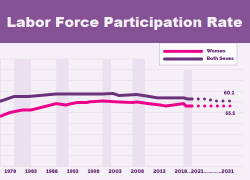The White House Blueprint for Addressing the Maternal Health Crisis identifies doulas as a critical segment of the maternal care workforce, providing vital support that improves maternal health outcomes. Doulas are nonclinical birth workers trained to provide continuous physical, emotional and informational support to a client before, during and after giving birth. Unlike licensed midwives, doulas do not provide clinical support, but instead serve as guides, advocates and emotional support for clients as they navigate the maternal health system.
However, workforce challenges, including insufficient reimbursement rates, unpredictable schedules and too few pathways to community-based training and certification, have contributed to a doula workforce that is small and insufficiently diverse. To address these workforce challenges and increase the size and diversity of the doula workforce, 10 states and the District of Columbia have expanded Medicaid reimbursement to cover doula services, with each program structured slightly differently and with a different maximum reimbursement amount.
In February 2023, the Department of Labor’s Women’s Bureau conducted two listening sessions with doulas and doula servicing organizations. The listening sessions took place in Birmingham, Alabama (a state that does not require health insurance coverage for doulas) and Providence, Rhode Island (a state that requires both Medicaid and private insurance coverage for doulas). The listening sessions identified job quality gaps, specifically with respect to state-by-state variations in insurance reimbursement.
Doulas who participated in the listening sessions told us about their passion for the work they do, and the challenges to remaining in the profession. Here are five takeaways from our conversations:
Being a doula is rewarding, hard work.
The work of a doula is intense and personal. It is also unpredictable. Doulas are on-call for clients’ births or to provide support as needed by text, phone and email. They miss birthday parties and holiday celebrations to be with clients. The demands of running a business, the intense and unpredictable schedule, and the need to take on other work for additional income cause many doulas to experience burnout and financial instability.
Being a doula is often not financially sustainable.
Doulas can only serve a few clients each month in order to provide high-intensity care and be available for births. Many doulas work multiple jobs to make ends meet. Any additional work they take on must be flexible enough to accommodate their doula work, which often means it comes with lower pay and fewer benefits than less flexible full-time or part-time work.
Requiring more training is not necessarily the solution.
Classroom training and formal certifications can provide important skills and knowledge, but they cannot replace hands-on experience. Training can also be expensive and time-consuming and some training and certification providers may not meet the needs of more diverse populations (including Black and queer doulas). Therefore, requiring specific trainings or only recognizing a limited set of certification providers can create barriers for individuals seeking to enter the field. Community-based and doula-led trainings, and particularly training by and for doulas of color, are effective strategies to build a more diverse workforce while ensuring that the training meets the needs of the community.
If designed thoughtfully, insurance reimbursement can improve doulas’ job quality.
A higher health insurance reimbursement rate with a flexible structure could help with schedule and pay challenges by more adequately compensating doulas for the work they do and by providing resources to enable them to hire employees to assist with administrative work, such as marketing and processing claims. Requiring a specific training or certification for participation in Medicaid and private insurance reimbursement creates additional barriers for doulas. To ensure that increased access to insurance reimbursement helps build a more diverse workforce, policymakers should be mindful of barriers to participation and work to reduce them.
There are challenges that can’t be solved through insurance reimbursement alone.
Insurance reimbursement cannot address every job quality gap identified by doulas. Other challenges that should be considered include access to childcare and trauma-informed mental health supports, and improving experiences with hospital and clinical staff.
Addressing these issues could help expand and diversify the nation’s doula workforce – leading to better quality of life for these essential workers and better support for America’s working families.
Mathilde Roux is a policy analyst in the department's Women's Bureau. Follow the bureau on Twitter @WB_DOL
EDITORS NOTE: The first paragraph of this blog has been edited to replace gendered references with more inclusive language.

 U.S. Department of Labor Blog
U.S. Department of Labor Blog


